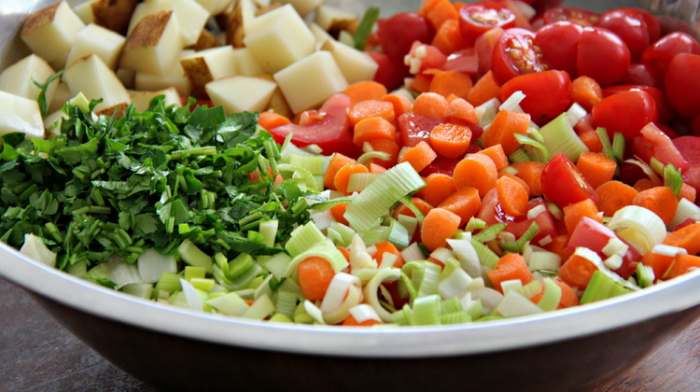Anti-oxidative nutrition
Some anti-oxidative food and nutrition from the book Thousand Plants against Cancer without Chemo-Therapy by Giuseppe Nacci , M.D.
Lycopene
Lycopene is one of the principle carotenoids, and it is found almost exclusively in tomatoes (Solanum lycopersicum), representing about 50% of all the plasmatic carotenoids.
Among all the carotenoids, Lycopene has the highest anti-oxidant ability known (625,626); its performance compared with phytochemical derivatives of exotic plants, or little-known plants, is still being evaluated.

Hippocrates Soup
Another property of Lycopene is its strong presence respectively in the testicles, the suprarenal glands and the prostate. The reason is not known: however it is suspected that if it is deficient, this can be at the root of specific pathologies such as tumors. Thus, an inverse marked connection between the level of Lycopene and tumors in the prostate area (and in the gastric and pancreatic areas too) has been observed, and therefore there has been the suggestion to look for the concentration of Lycopene in the blood, which should be very low in patients with tumors (similar to what has already been shown by Cameron with regard to vitamin C [SEE chap.3.c]).
The amounts of Lycopene present in plasma and in the skin are comparable with those of beta-Carotene. When the skin is under oxidative stress from ultraviolet radiation, a larger amount of Lycopene is destroyed compared to beta-Carotene, suggesting, therefore, a role for Lycopene as an anti-oxidative factor.
Lycopene, which is contained above all in tomatoes, is particularly efficient in prostate carcinomas (633,1359) In this work, researchers from the University of Illinois, Chicago, studied men who consumed tomato sauce-based dishes (30 mg/day of Lycopene) for three weeks preceding a radical prostatectomy. They dicovered that after the dietary intervention, serum and prostate Lycopene concentrations were significantly increased. In addition, compared with pre-intervention levels, leukocyte oxidative DNA damage was significantly reduced and prostate tissue oxidative damage was also lower in the Lycopene group than the control group (1359): Longwer Chen: Oxidative DNA damage in prostate cancer Patients consuming tomato sauce-based entrees as a whole-food intervention, Journal of the National Cancer Institute Vol. 93, No. 24, pp.. 1872-1879, 2001
http://www.erbeofficinali.org/dati/nacci/studi/licopene%20(pomodoro)%20induce%20il%20PSA%20nel%20CANCRO
%20della%20PROSTATA.pdf
Organic acids
Organic acids, which are among the thousands of co-enzymatic factors contained above all in citrus fruits, grapes, apples, pears, bilberries, blackberries and other fruits of the forest, have a particular protective role.
The Malic acid, Citric acid, Tartaric acid and Tannic acid present in variable proportions, and therefore responsible for the different flavors that the fruit has, play a particular role in the maintenance of the health of mankind.
Contrary to what people think, these acids, once they have been absorbed by the intestine and passed into the blood supply, do not have an acidifying effect, but an alkalizing effect. In fact, since they are „weak acids“, they degrade easily in the presence of oxygen, thus producing carbonic acid.
The latter combines with sodium and above all with potassium to form carbonates and bicarbonates. Together, these newly formed molecules are called „alkaline reserve“, and it makes up that resource which the organism uses to neutralize acids of different origin which form inside it during the course of many pathological illnesses such as cancer.
Fruits of the forest, citrus fruits, apples and pears are therefore absolutely necessary for the organism, especially if it is ill, and they should be always eaten uncooked and fresh.
NOTE : all rich of vitamin B 17 (SEE chap. 7)
Hippocrates Soup
Recipe for Hippocrates soup: For one person use a 4-quart pot, assemble the following vegetables, then cover with distilled water: 1 medium celery knob (or 3 to 4 stalks of celery), 1 medium parsley root (if available), garlic, 2 small leeks (if not available, replace with 2 medium onions), 1,5 Ibs tomatoes or more, 2 medium onions, and a little parsley.
Do not peel any of these special soup vegetables; just wash and scrub them well and cut them coarsely; simmer them slowly for 2 hours, then put them through a food mill in small portions; only fibers should be left. Vary the amount of water used for cooking according to taste and desired consistency.
